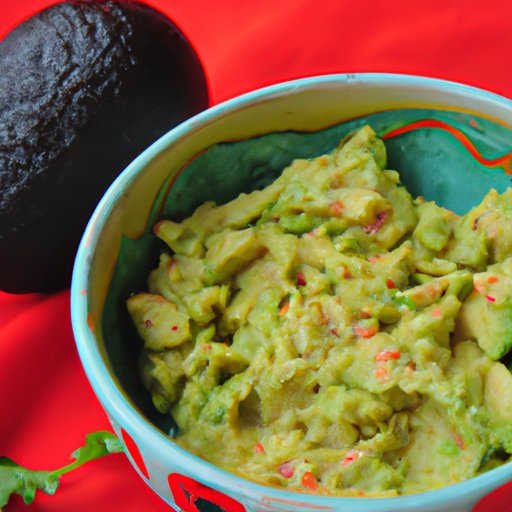Introduction
Guacamole is a traditional Mexican dip made from mashed avocados, onions, tomatoes, cilantro, lime juice, and salt. It has become a popular snack around the world and is often served with chips or tacos. But is guacamole actually good for you? In this article, we’ll explore the nutritional benefits and potential risks of eating guacamole so you can make an informed decision about whether it is a healthy snack option for you.
Nutritional Breakdown of Guacamole
One cup of guacamole contains approximately 240 calories, 22 grams of fat, 11 grams of carbohydrates, 4 grams of protein, and 8 grams of fiber. It is also rich in vitamins and minerals, including vitamin K, folate, potassium, vitamin B6, and vitamin C. The majority of the fat content in guacamole comes from monounsaturated and polyunsaturated fatty acids, which are considered “good” fats compared to saturated and trans fats.

Guacamole as a Healthy Snack Option
Despite its high calorie and fat content, guacamole can still be a healthy snack option when eaten in moderation. The high-quality fats found in guacamole can help lower cholesterol levels and reduce the risk of heart disease. Additionally, the fiber content in guacamole helps keep you feeling full longer and aids in digestion. Furthermore, guacamole is a great source of antioxidants, which help protect your cells from damage caused by free radicals.

Healthiest Ways to Prepare Guacamole
It’s important to remember that not all guacamole is created equal. To maximize the health benefits of guacamole, it’s important to use fresh ingredients and avoid adding unhealthy ingredients like mayonnaise or sour cream. Additionally, it’s best to use minimal amounts of salt and other seasonings to keep the calorie and sodium content low.
Potential Risks of Eating Too Much Guacamole
Although guacamole can be a healthy snack option when eaten in moderation, there are some potential risks associated with eating too much guacamole. Its high calorie content can lead to weight gain if eaten in large quantities. Additionally, since guacamole is typically made with raw ingredients, there is a risk of foodborne illness if it isn’t prepared properly. Finally, guacamole can be a trigger for overeating due to its creamy texture and flavor.
Conclusion
Overall, guacamole can be a healthy snack option when eaten in moderation. It is rich in vitamins, minerals, and healthy fats, and it is a great source of fiber and antioxidants. However, it is important to remember that guacamole is high in calories and can be a trigger for overeating. To get the most out of guacamole nutritionally, it’s best to use fresh ingredients and avoid adding unhealthy ingredients like mayonnaise or sour cream. Additionally, it’s important to practice portion control and limit your intake of guacamole to prevent potential risks associated with eating too much.
(Note: Is this article not meeting your expectations? Do you have knowledge or insights to share? Unlock new opportunities and expand your reach by joining our authors team. Click Registration to join us and share your expertise with our readers.)
